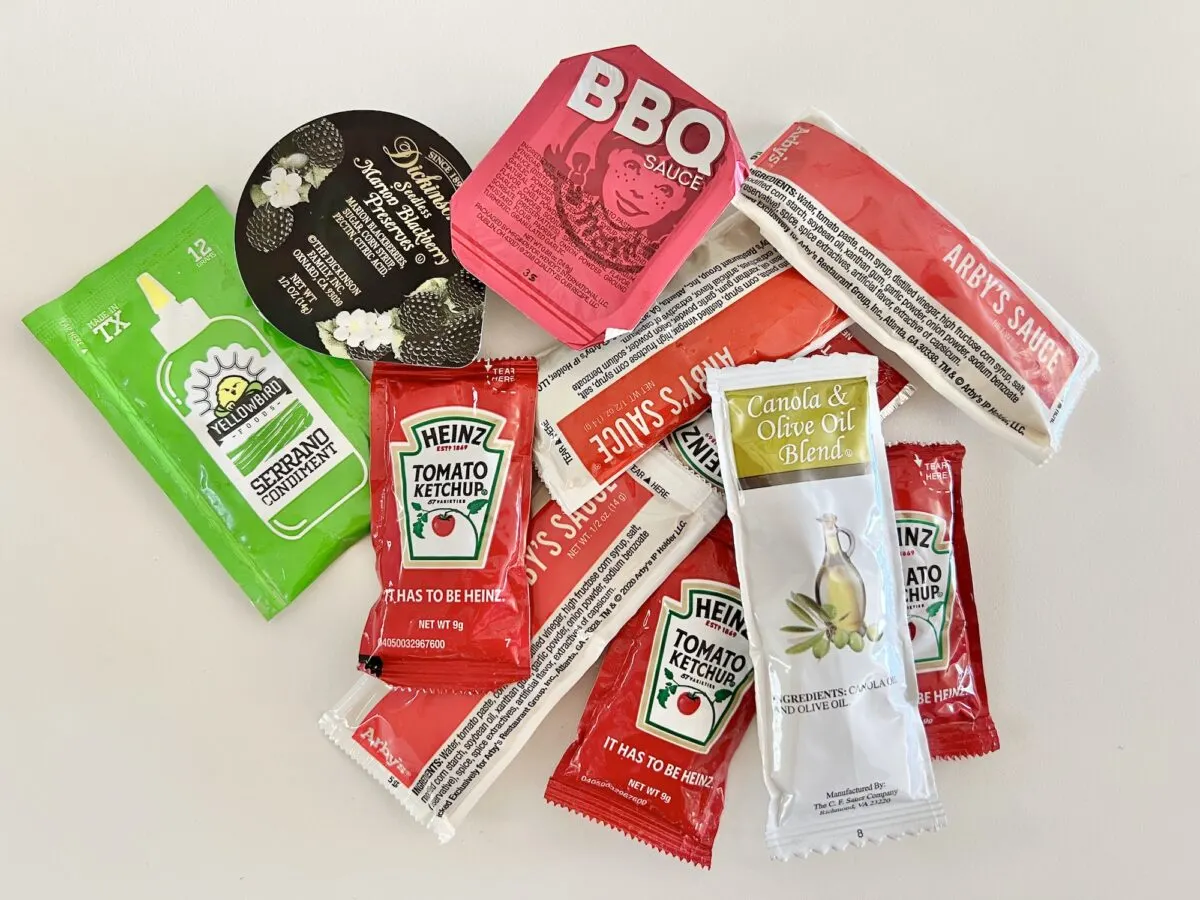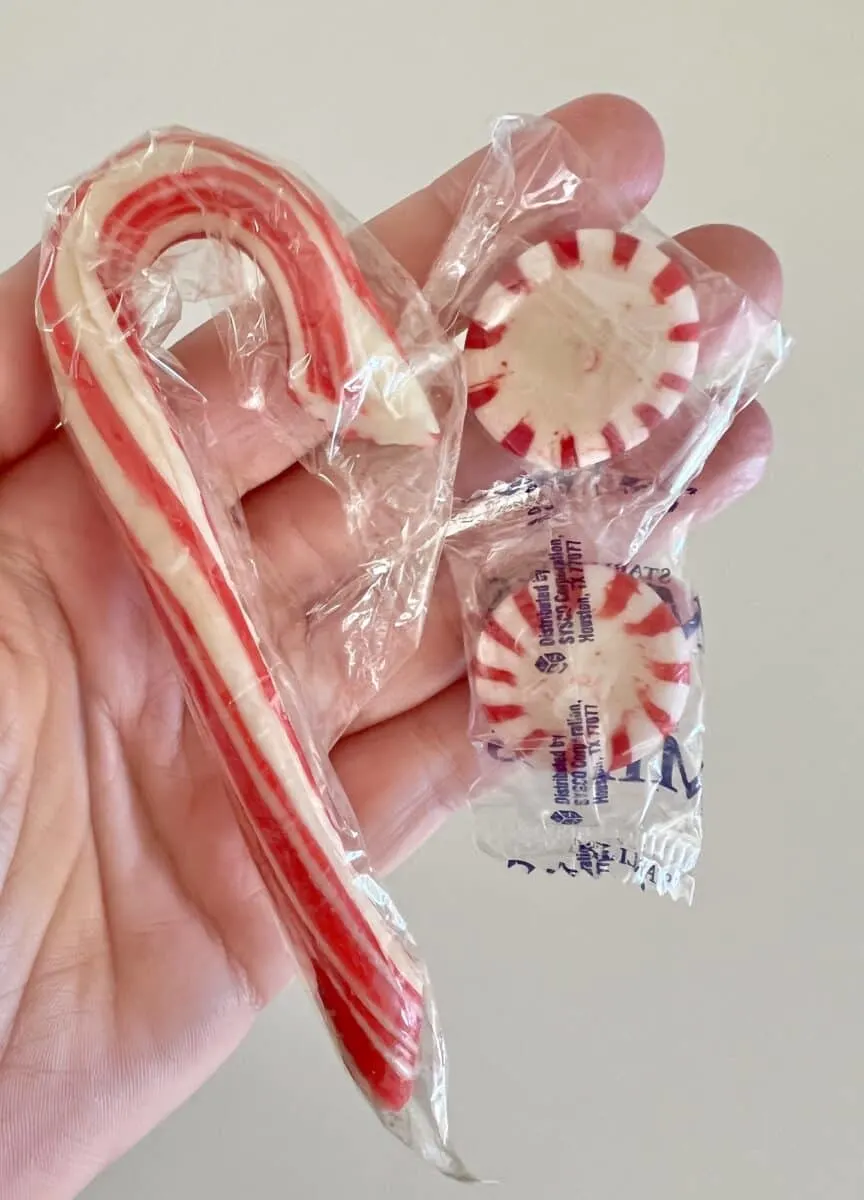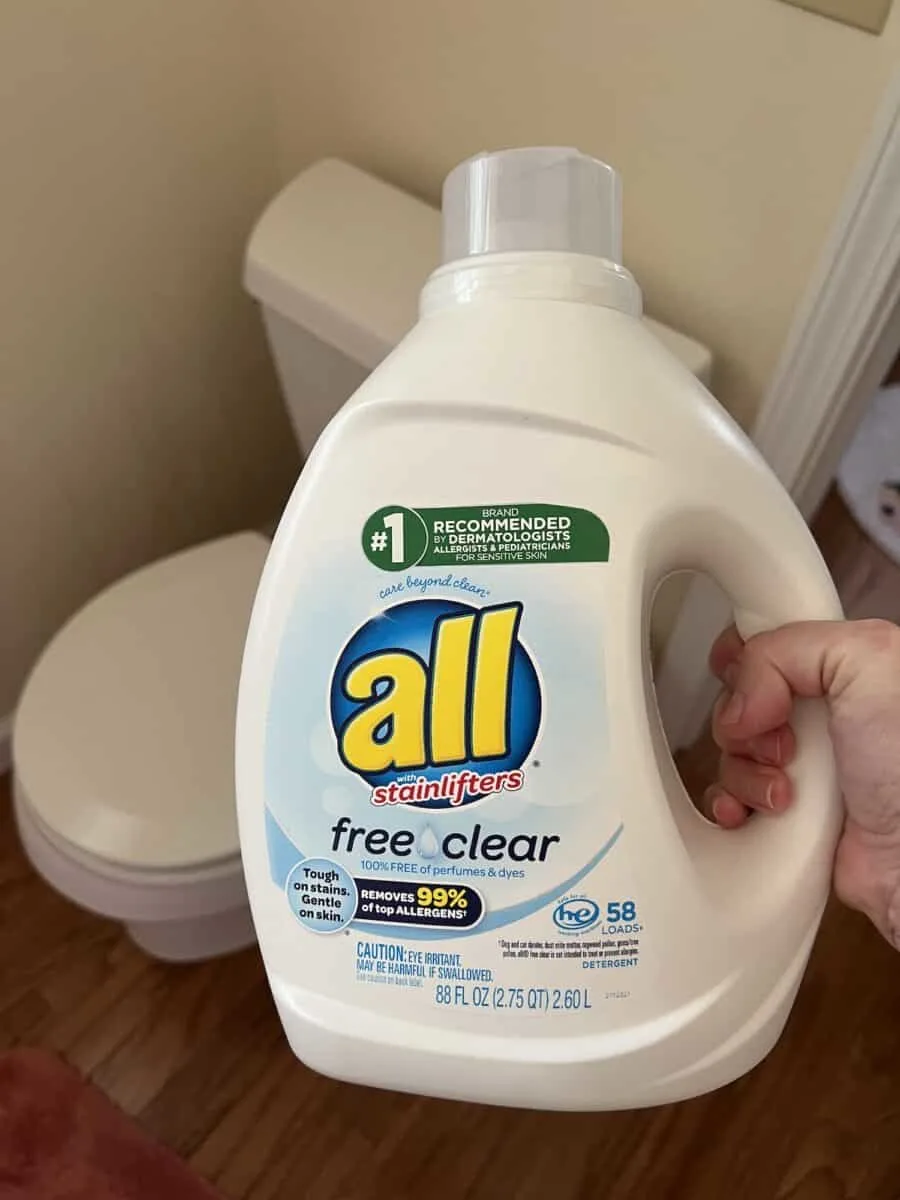Gathering prepper supplies can be expensive, especially if you are on a limited budget. And you might not want to spend money on items that you hopefully will never need to use, right? Thankfully, you can get some supplies that you should have at home at no cost to you.
These are some of the best ways for how to get free prepping supplies. Adding these items to your prepper supplies can ease your mind and reduce some of your expenses for emergency preparedness and grid down living.
Where to Get Free Prepping Supplies
1. Condiments and Spices
You will need delicious condiments and spices to make shelf-stable foods taste good. It is easy to stockpile a decent supply at no cost to you.

Keep all of those condiment packets that come in fast food take-out or food delivery. If you are eating out and you don’t use all of the packets you have taken, bring them home with you. These include:
- Ketchup
- Mustard
- Mayo
- Relish
- Horseradish Sauce
- Arby’s Sauce
- BBQ Sauce
- Honey Mustard Sauce
- Salt
- Pepper
- Sugar
- Sugar-substitutes
- Salad dressings
- Jelly
- Honey
Helpful Tip: Store packets in a plastic zip top bag or plastic container with a lid and note the month or year that you got them. Since these individual servings don’t have expiration dates, it can be very difficult to figure out which packets were stored two years ago versus which ones are just a couple months old.
If you want to prepare hot meals in a grid down situation, these are the best low wattage electric burners you can use with a portable power supply.
2. Candies
You know how you see a bowl of hard candies at restaurants or doctor’s offices, or the miniature candy canes around Christmas? Even if you don’t plan on eating it right then, take one.
Over time, all of the candies that you gather will add up to a sweet stash that is perfect for boosting morale!

Store hard candies in a glass jar with a lid or a mason jar. Keep out of the heat so that they won’t melt.
Comfort foods are important in times of stress, so having a supply on hand, however small, will make a difference.
3. Disposable Utensils
If you get a lot of take-out meals for eating at home, you will probably have disposable cutlery in your bags. Use your utensils at home and keep those wrapped packets of cutlery for your prepper supplies.
If there is no water during an emergency, you won’t have the ability to wash dishes. You will need disposable knives, forks and spoons.
The disposable napkins, along with salt and pepper packs that are in many to-go kits, will also be welcome.
4. Get Free Food
Use the Ibotta app to score free food. The cash-back app used in grocery stores and other retailers often has food or drinks that are free after a rebate. Some of these are non-perishable items and are great for adding to your stockpile.
Couponing can be a great way to get items for free, as well. Especially toiletries and non-perishable foods and drinks. Look for coupons everywhere, including the newspaper, online and in promotional mailings or magazines. Combine coupons with a sale to get items for free.
5. Save Seeds for Growing Food
If you are a gardener, learn how to save and store seeds from your harvest. This only works on heirloom seeds, which can be propagated and seeds collected for another year’s harvest.
I have tutorials on how to save cosmos seeds and how to save nasturtium seeds which show that seed saving is easy. For edible plants, check out my guide to harvesting mustard green seeds.
6. Plant Exchanges
Exchange seeds or plant cuttings with other gardeners, in gardening groups, or online seed exchanges. You could have flower seeds or cuttings that others would like in exchange for seeds or starts of their edible plants.
Add these plants into your landscape for a food supply in future years.
7. Free Medical Supplies
Ask your local hospital, health department or other medical provider if they have free supplies available to the community. I once got an offer of a free first aid kit from a hospital that was opening in our area.
I’ve seen free KN95 masks given out by insurance companies and pharmacies.
Go online to your local hospital or health department’s website to see if there are any opportunities.
Keep in mind, masks are essential in a variety of emergencies, including protection from smoke and ash in the air, chemical exposure in the air, and contagions.
Health fairs are great places to get free samples of vitamins, protein powders, band aids, mini first aid kits, etc.
Grocery stores and food co-ops often have special events where vendors give away free foods and samples. I’ve seen packs of trial size samples of vitamins or pain relieving gels for free in health food stores.
8. Air Tight Storage Containers
Glass jars with lids can be cleaned and sanitized and used to store wrapped candies or other wrapped foods away from pests.
You can also store items such as pasta, sugar and rice in reused spaghetti sauce jars, pickle jars, etc.
Personally, I really like using Rao Soup glass bottles to store items. They are a good size, the soup is excellent and I buy them when they are BOGO at the supermarket!
Put an oxygen absorber in each jar to preserve the life of the stored food. It’s a small investment that can prolong the life of your food for several years.
9. Storing Water

Laundry detergent bottles are great for storing water to use in toilets during an emergency. Just be sure to wash and rinse out the bottles a few times and then store water. Only keep the water for 3 months before refreshing with new water.
These are great to keep in your bathroom or garage for emergency water use.
Reused laundry detergent bottles should NOT for drinking water or potable water.
Plastic soda bottles or tea bottles can be reused to store drinking water. Just be sure to clean them out properly. Fill with water, but only keep for a few months at a time.
Tap water stored in jugs can start to grow microorganisms over time. Filter the water stored in these bottles with a Berkey Filter or another great water filter, such as a Lifestraw to remove any contaminants that might have grown.
10. Ask for Gifts
Ask for items for Christmas gifts or birthday gifts. Friends and family are always looking for ideas to give gifts! Just make your wishes known that you’d like a few things.
You might not want to ask for shelf stable boxes of milk (ha ha!), but you could ask for a First Aid Manual, solar-powered lights, a first-in-first-out can organizer, or a portable power station.
If your family or friends don’t believe in prepping or make fun of your worrying about preparing for emergencies, then ask for items that could be used without their knowledge.
For example, a grocery store gift card or home improvement store gift card. Candles are a great gift. Or ask for a pretty plant that happens to be an edible plant or has medicinal uses, such as an aloe. Indoor growing kits would be smart, too.
Books are another option, if you request a basic cookbook or intro for gardening.
11. Keep Your Donation Pile
Don’t give away clothing just because you have put on a few pounds. Some items, such as denim jeans or long sleeve shirts, might come in handy in an emergency. Keep these packed away with your emergency supplies.
In emergencies that last more than just a few days, you might find that those clothes fit again and will be welcome if you have to clean up outside debris, deal with flooding or damp conditions indoors, etc.
12. Gather Wood
Create a pile of the tree branches, limbs and twigs that fall from the trees. Instead of getting rid of them with the yard waste, keep the wood in case you need to make a fire to cook or to heat.
13. Keep Cardboard
Small cardboard boxes and sheets of cardboard can be used to fuel a mini camping stove, which can heat food or boil water over the small flame.
Large cardboard sheets can be fit inside windows during grid down conditions. If it’s summer time, the cardboard can block the sun’s rays and keep your home from getting too hot inside.
14. Save Bubble Wrap
Though bubble wrap is fun to pop to hear the noise, it actually is smart to have on hand in emergencies.
Bubble wrap can help insulate your windows in the winter to conserve heat and improve the temperature inside your home.
Mist some water on the flat side of bubble wrap and then apply to the inside of your windows. The bubble wrap will stay up on the window for a few days like that. It will trap in the sun’s heat and help to insulate your home.
15. Don’t Get Rid of Old Towels or Sheets
Even though you might not want to use sheets that have worn-out elastic or towels with holes and rips, the items are great for prepping. You can use these textiles as rags to clean up messes or soak up moisture from a flood.
Wrap the towels or sheets into a roll and put under doors to prevent cold air from coming into your home.
Sheets can also be used to hang in windows to keep sunlight out or to help insulate your room from cold air blowing through cracks.
If you need to stay warm without heat, layering on all of these towels and sheets can help conserve body heat if you don’t have extra blankets to use.
16. Make Fire Starters
Keep your dryer lint and empty toilet paper tube rolls to make free fire starters. Stuff the lint inside the paper cardboard tube and toss on a stack of wood or twigs to help start the fire.
See my DIY fire starters for some great ideas.
17. Use Facebook Marketplace, Craigslist and Buy Nothing Facebook Groups
Keep an eye on Facebook Marketplace or Craigslist for people giving away items. Sometimes, when people are moving, they just want to get rid of items rather than sell them.
At the end of garage sales, sometimes people would rather give away items rather than pack them back up. You never know what you can find.
As part of my local Buy Nothing Facebook group, there has been some awesome things given away that would have been perfect for prepping. For instance, someone was giving away boxes of unopened medical gauze, while another person was giving away bags of rice and beans that they wouldn’t be eating. I’ve seen tents and plants and other great stuff offered for free to keep it out of the landfills.
18. Maps
In a grid-down situation, you won’t be able to pull up Google Maps or your GPS system to find out how to leave home if needed. Be sure to have a paper map of your hometown and surrounding area to reference if you need to navigated closed streets.
Most tourist boards give away free maps to the city. Get a state map as well at welcome centers. You might also be able to request a free map to be sent to you via the state or city tourism board online.
19. Entertainment
If the power goes out, there will be no internet, games or videos to watch. And that can mean boredom pretty quickly!
When people are giving away books or games, take them! Put them in your entertainment library!
A great place to stock up on books (while donating some things of your own) are Little Free Libraries found across America and around the world.
20. 5-Gallon Buckets
Many bakeries, food service business and even restaurants give out free 5-gallon buckets that they can’t use. The business’ supplies come in those buckets, and they receive more than they can put to good use, so they give them away.
As more people are prepping, it is not as easy to find free buckets. Many businesses are charging for them now. But that doesn’t mean that you can’t find free ones, and your local food service businesses might still be giving them away.
Wal-mart and Publix bakeries have been known to give away free buckets. Just wash out the icing really well!
These buckets are perfect for storing food and water in, other supplies, catching rainwater, growing edible plants, etc.
I used a 5-gallon pickle bucket to make an emergency toilet to have on hand. See my Youtube video for instructions.
21. Gleaning
The word glean means to gather food that would otherwise go to waste. For instance, fruit from trees in an abandoned lot. Or wild blackberries growing in a vacant field.
You could even glean tomatoes from a neighbor who is on vacation (with their permission) that would otherwise go to waste because they will spoil before they get back.
These fruits, vegetables and other foods can then be dehydrated, frozen, free dried or canned to keep for later.
There are many ways to go about this, and you always want to make sure that you have the right to take food from property that otherwise appears vacant.
Never harvest from privately owned land where you don’t have a legal right, or from pubic lands in which it is prohibited.
22. Ice Packs
If the power was to go out for a while, you need everything in your freezer to stay frozen for as long as possible. Empty spaces in your freezer allow food to get warm more quickly, so you want to fill in as much available space as you can, while still having proper air flow.
You can do this with homemade ice packs. It can be as simple as filling zip top bags with water and freezing them flat. All of those ice packs can keep food colder longer in an emergency.
A bonus is that the water can be used once it has thawed out for washing, bathing, or other uses.
23. Education
There are so many skills to know and learn in case of emergencies. Don’t rely on the internet or Youtube being available to you when you need the information.
Take online classes, watch Youtube videos or check out books from the library. There is always a new skill you can learn, from sewing to cooking to canning to gardening.
It is also smart to download free eBooks and other information to your computer or tablet for use offline.
24. Plastic Sheeting
Large plastic bags and sheets of plastic, such as the type used for shipping appliances or furniture, are great to use in an emergency.
The plastic sheets can protect from moisture. They can be used to block drafts in doorways and windows and to seal off unhealthy air from the room you are in.
Plastic sheeting can also help you to gather rainwater. Or use as a small, makeshift tent. There are a variety of ways to use this plastic. Be sure it is dry with no moisture on the plastic before folding it up for storage.
25. Rainwater
Rain falling from the sky is free water for you to save. You just need to have a way to collect it.
If you already have rainwater catchment systems, good for you! Keep storing the water.
If not, think about how you can capture rain water if you need to. A rain chain is great for directing water from your gutters or roof into a bucket.
Or, make sure that you have plenty of buckets, plastic totes and other large pails that you could put outside and collect water for drinking, bathing, and cooking.
You will need to filter the water after collection, though, so keep that in mind.
26. Important Documents
You need to have important information written down or printed in case you cannot find a digital file in an emergency. If the internet is down, or you can’t use your phone or computer, you might not be able to get important information that you need.
Be sure to keep written records of documents, certificates, files and phone numbers such as:
- Family member’s phone numbers and addresses
- Friends and neighbor’s contact information
- Doctor’s phone numbers
- Bank account numbers
- Insurance policy numbers
- Birth certificate
- Wedding certificate
- Immunization records
- Medical records
- Property titles
27. Compost
Make free fertilizer and soil from things you are throwing away! Compost is a rich organic matter that looks like potting soil, but is rich in nutrients like fertilizer.
Yard waste and food waste can be turned into compost for free. If you are throwing away vegetable scraps, food waste and even lawn clippings you are missing out on the chance to make compost.
Leaves can also be cut up and left to decompose to make a rich leaf mulch that can add nutrients and microbes to your garden.
You can also watch my Youtube video talking about these free things to prep and why:
Not every item that you should be stockpiling for a disaster, emergency or SHTF scenario has to cost a lot of money. There are plenty of ways to find free prepper supplies.
Check out these fun Stocking Stuffers for Preppers for more great ideas!

